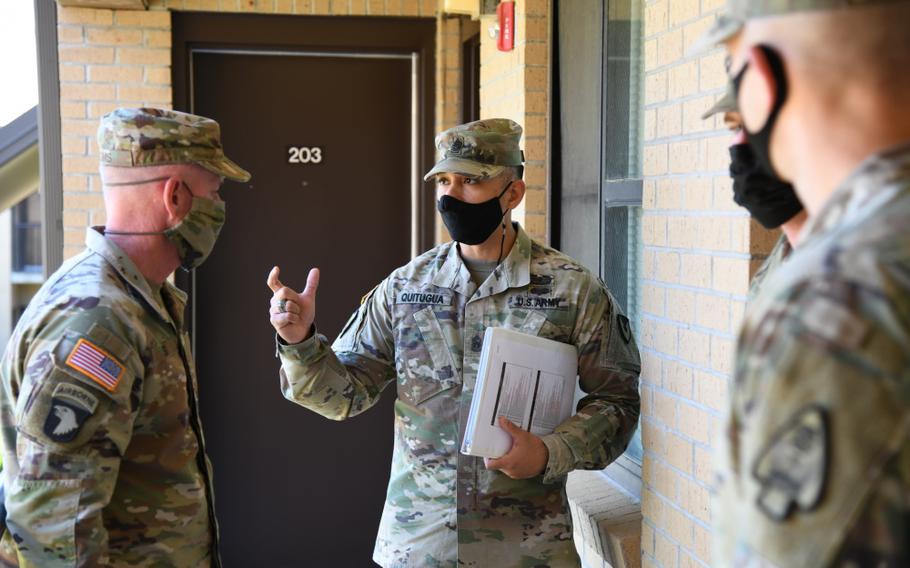
Command Sgt. Maj. Raymond Perez Quitugua Jr., Fort Rucker garrison command sergeant major, provides a tour of the barracks for Command Sgt. Maj. Todd Sims, U.S. Army Forces Command command sergeant major, during his visit to Fort Rucker , Ala., April 19, 2021. (Kelly Morris/U.S. Army)
An Alabama military base is taking increased actions to combat the ongoing prevalence of coronavirus infections, authorizing leaders to ask for proof of vaccination of service members not wearing a mask while on duty. It is the first military base in the continental United States to allow leaders to check the vaccination status of those in uniform.
The new guidance at Fort Rucker comes as the new delta variant of the virus continues to drive infection rates and now accounts for a majority of cases in the United States. The base is among facilities, including Fort Leonard Wood in Missouri, Fort Sill in Oklahoma and Fort Jackson in South Carolina, where less than half of the surrounding populations have been vaccinated.
The order issued Tuesday by Maj. Gen. David Francis, commanding general of Fort Rucker, states that unmasked uniformed personnel “must be prepared to show proof of vaccination” when on the base.
“Due to the rising rates in the counties around us and some on Fort Rucker, we’re now implementing G.O. number 12,” Francis said in a video posted July 12 on Fort Rucker’s official Facebook page, referring to the general order issued to Fort Rucker personnel. “The big difference is going to be that if you are not wearing a mask, the leadership will be able to ask you, ask soldiers, to prove that they’ve been vaccinated by showing their vaccination card.”
The new rule applies only to uniformed personnel, of which there are about 5,000 assigned to the base. The base, which houses the Army’s aviation branch, is also home to thousands of civilian dependents and civilian employees.
Civilian employees on the base “must be taken at their word unless the supervisor has good reason not to,” reads the official order, issued Wednesday.
On Tuesday, Pentagon spokesman John Kirby said that about 70 percent of military personnel have received at least one dose of a coronavirus vaccine.
“That’s encouraging, but there’s more work to do, and so we continue to be in the mode of encouraging troops to get vaccinated to the maximum degree,” he said.
In Alabama, just 33 percent of the population is fully vaccinated and just over 40 percent has received at least one dose, which is well below the national average, according to data from The Washington Post. In Dale County, where Fort Rucker is located, the daily average for coronavirus infections is at 12 cases per day. Alabama is also among states that have enacted legislation banning vaccine passports or requiring immunization to receive government services.
“This measure is very important so that we can nip this in the bud,” Francis said in his statement.
While the Pentagon has issued overall guidance for maintaining readiness and personnel safety since the start of the pandemic, which has included recommendations for unvaccinated personnel to continue wearing masks when required, there have been no orders issued to enforce checking vaccination status. Individual commanders, however, have been allowed to issue their own guidance.
In South Korea, the commander of U.S. forces on the peninsula issued an order last week requiring all affiliated personnel to wear masks while on U.S. installations, and placed bars and nightclubs off limits.
“While we have achieved more than 80 percent vaccination rate, we are witnessing small clusters of the virus’ spread within select locations,” Gen. Paul J. LaCamera, the U.S. commander, said in a statement. “To protect our communities and our mission, we are implementing an immediate, aggressive approach to preventing the virus’ spread any further.”
South Korea reported 1,316 new cases of the coronavirus Friday, a sharp increase during the latest wave of the virus in that country.
As in other coronavirus hot spots around the United States, the majority of infections in Alabama are from the delta variant of the virus.
While Kirby stated on Tuesday that Pentagon is “watching [the variant] with concern,” there have been no official policy changes for military personnel.
At a briefing on June 30, acting assistant secretary of defense for health affairs Terry Adirim said the Defense Department is “particularly concerned with the impact of the delta variant on our unvaccinated or partially vaccinated population and its potential spread at installations that are located in parts of the country with low vaccination rates.”
Lt. Gen. Ronald J. Place, director of the Defense Health Agency, said June 30 that vaccination is just one of the factors that the local commander would take into consideration. “What’s the positivity rate? What’s the total numbers? What’s the vaccination rate in that community versus that . . . on the installation? It’s a multifactorial decision.”
Vaccination against the coronavirus remains voluntary for all military personnel and Defense Department employees while the vaccines await full approval by the Food and Drug Administration.